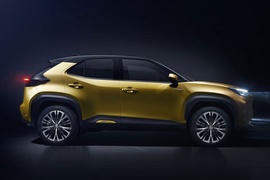The Yaris nameplate is around for quite some time, proof of its success in Europe.
But this time, Toyota decided to enter the B-SUV market, confident that the brand’s fans would be excited.
Extremely versatile, the Yaris Cross offered features of an SUV combined with a nice design, a mud’s friend and a family’s trusted companion.
Talking about versatility, the Yaris Cross was designed to do well in all different situations. The trunk would open if tapped with the foot, and the cargo area was equipped with holding straps to prevent luggages from falling over. Once the trunk floor was lowered, the space increased considerably.
The exterior design was based on the image of a diamond, having sharp and strong lines.
As we said, a bit of mud was never an issue for the new Yaris, having a high ground clearance and bold fenders on top of the 18-inch wheels.
We already concluded that the car was versatile and suited every need, but Toyota focused on the CO2 emissions as well. The Yaris had the 4th generation of hybrid technology, with emissions lower than 90 g/km CO2 for the 4WD.
Both the 3-cylinder 1.5-liter petrol engine and the 59 kW Li-Ion battery provided a total of 116 hp, thus making it an agile car that was great in overtaking.
The new Yaris was based on TYNGA (Toyota New Global Architecture) and offered a higher driving position, body rigidity, a low center of gravity and a reduced body roll.
Fuel efficiency, SUV styling, spacious and practical, what else would someone need more?

























































